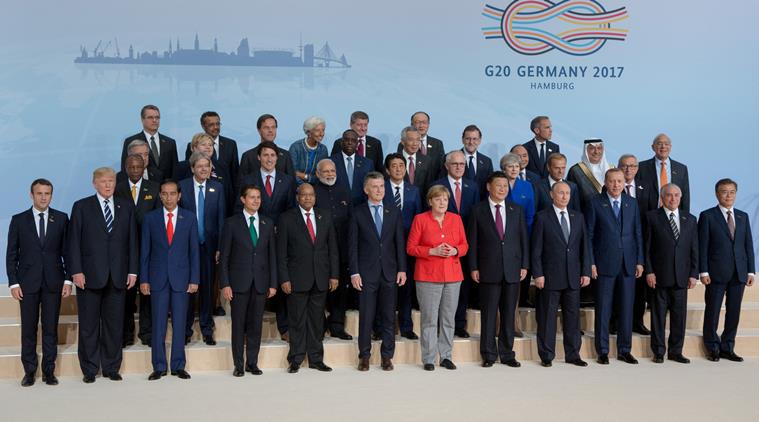G20 leaders commit to keep markets open, unfair trade practices
Jul 09, 2017
G20 summit: Mindful of the needs of emerging economies, like India, G20 leaders called for the completion of International Monetary Fund (IMF) quota reforms and vouched for a new quota formula to be implemented by 2019.

In a communique after their two-day summit in Hamburg, Germany, the G20 leaders on Saturday vowed to fight protectionism, which includes all unfair trade practices, and promote greater inclusiveness in global economic growth. In the communique, the G20 nations, including India, admitted that while the current growth prospects are encouraging, the pace of growth is “still weaker than desirable”. The leaders emphasised the importance of transparency for predictable and mutually beneficial trade relations, adding that they would strive to ensure a level playing field.
The communique said the nations would “continue to fight protectionism, including all unfair trade practices and recognise the role of legitimate trade defence instruments in this regard”. “We underline the crucial role of the rules-based international trading system,” the communique said, adding that the benefits of international trade and investment have not been shared widely enough.
Mindful of the needs of new emerging economies in the world, the G20 leaders on the last day of the Summit, called for the completion of International Monetary Fund quota reforms and vouched for a new quota formula to be implemented by 2019, reported PTI. On Monday, all the G20 members had backed India on the issue of quota reforms of the IMF and called for early reforms, and expressed disappointment with the delay.
“We remain deeply disappointed with the continued delay in implementing the IMF quota and governance reforms agreed in 2010. The 2010 reforms remain our highest priority for the IMF and we urge the United States to ratify these reforms as soon as possible,” the G20 communique issued at the end of the two-day summit, said on Monday.
Earlier in the day, PM Modi had also expressed his hope that the US would ratify the quota reforms of the International Monitoring Fund, a key demand of the developing countries. “IMF should remain a quota-based institution and not depend on borrowed resources. I hope that the ratification of the reforms of 2010 in the United States would be completed at the earliest,” Modi had said on Monday.
A communique from the G20 on the issue said, “We ask the IMF to complete its work on an interim solution that will meaningfully converge quota shares as soon as and to the extent possible to the levels agreed under the 14th General Review of Quotas. The 14th Review should be used as a basis for work on the 15th Review, including a new quota formula. We reaffirm our commitment to maintaining a strong, quota-based and adequately resourced IMF. We reaffirm our agreement that the heads and senior leadership of all international financial institutions should be appointed through an open, transparent and merit-based process and we reiterate the importance of enhancing staff diversity in these organisations. We reaffirm that the Special Drawing Rights (SDR) basket composition should continue to reflect the role of currencies in the global trading and financial system and look forward to the completion of the review of the method of valuation of the SDR.”
IMF reviews quotas of its member countries every five years, and the last such review took place in 2010. India has agreed to the revised quota rates, which will increase is quota share from the current 2.44 per cent to 2.75 per cent. This makes India the eight largest quota holder at the IMF, up from the 11th position.
Emerging economies like India, Brazil, China and Russia have been asking to increase their voting right at IMF, which would reflect their growing share in the world economy.
Meanwhile, G20 leaders also discussed a range of issues, one of which was on ‘digitisation’, where the leaders said digitisation would provide opportunities for creating jobs. But they, however, said there is a need to develop the skill set of the workforce for the future.
Acknowledging the malicious uses of Information and Communication Technology, the leaders also said that such technology in the wrong hands could endanger the financial stability of any country.
Source: The Indian Express